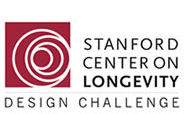2017 Stanford Center on Longevity Chair Challenge Winner Announced
Congratulations to “Biza Chair” from the Centro Universitário Newton Paiva in Belo Horizonte, Brazil for winning the Chair Design Challenge!
Congratulations to “Biza Chair” from the Centro Universitário Newton Paiva in Belo Horizonte, Brazil for winning the Chair Design Challenge!
Team Lead: Özge Armutcu
University: Koc University at Istanbul
A social network and informational resource for seniors connected to an online marketplace, Yedi70 was partly inspired by attendance at the Global Summit on Aging 2.0 in San Francisco last May, where the team met the managing board of the Stanford Center on Longevity. “We were very inspired by their mission, and we noticed that our vision matched theirs,” says team lead Özge Armutcu. “This was the reason that we decided to pursue this challenge.”
Yedi70 was also motivated by a personal tragedy among the team:
“Fatih, one of our cofounders, lost his grandmother in 2013 due to pancreatic cancer. After this loss, he talked with her friends, now the partners of Yedi70. After further research, we found that there was a reality that we were never aware of: the world is aging drastically. We started thinking about how we could improve quality of life and preventative health among seniors.”
Time Developing Yedi70
“We started the project on July 6th 2015, and the website was launched in October 2015. We are still using the first version of our design; however, day by day we are implementing new features while keeping the core essence of our design. For instance, we launched our personalization technology in February 2016.”
Design Lessons Learned Creating Yedi70
‘From our initial research, we found out that the world population is aging drastically. During our testing period, we noticed that people needed guidance and systematic recommendations along with services that they can easily access through a personalized marketplace.”
Future Plans for Yedi70
“By the end of December 2016 we would like to reach 300,000 members in Turkey. We believe that our design is not bound to any location, but on the contrary, can be a global solution for seniors. Starting in 2017, we want to scale our model to the US market, and then expand our model globally.”
Team lead: Brandon Lopez
University: San Francisco State University
City Cart is a walker/cart hybrid designed to help users with mobility issues safely and easily make shopping trips. A finalist in the Mobility category of this year’s Design Challenge, it was created by design students at SF State’s Product Design 2 course.
“Our professor Ricardo Gomes explained the design brief to us and how we would have the opportunity to design a shopping assistant for the elderly or people with mobility issues,” says team lead Brandon Lopez. “Our team wanted to enter because we all have a dream of being able to help others with our ability to design.”
Lopez credits the inspiration for City Cart to Dr. June Fisher, a colleague of Professor Gomes who offered guidance on the design:
“June loves to visit her local farmers’ market and shop for produce, but her current mobility doesn’t allow her to comfortably do so without help,” says Brandon. “We wanted to design a product that would allow June to take the walk to the farmers market, fill up her basket with everything she needs, and return home without assistance from anyone else.”
Prototyping City Cart
“Our entry was created over an entire semester. We created many different versions on paper and 3D modeling software that led us to create three different full-scale prototypes made of wood and steel. We also 3D printed a quarter scale prototype of our final design.”
Lessons Learned from Designing City Cart
“The problem must dictate the entire design. From the start, we had many ideas that we believed would assist our users, but found out that we needed to slow down our creative minds and listen to the actual people we are designing for. Just talking with potential users and providing them with prototypes to test allowed us to receive invaluable feedback. This feedback was then repeatedly fed back into our next iterations until we created a design that solved our users’ problem.”
Future Plans for City Cart
“If we win the Challenge, we would love to work to bring City Cart to market. Throughout our research and development, we have found that there is a real problem that has not been addressed. If City Cart became an actual product, many seniors and disabled people would have a product that would make their daily lives a little easier.”
 “ENABLING PERSONAL MOBILITY ACROSS THE LIFE SPAN”
“ENABLING PERSONAL MOBILITY ACROSS THE LIFE SPAN”
The 2014-2015 Challenge focused on solutions to empower mobility among older adults at a personal level by:
This challenge combined two important goals: designing solutions that maximize an individual’s mobility and keeping older adults actually using these solutions in order to achieve real benefits.
